The Wind and the Reckoning – A Film About Hawaiiʻs Past
If you are resident in Hawaiʻi, you may already have had an opportunity to see The Wind and the Reckoning. If not, hurry to catch it before the movie theaters get swamped with holiday films! Filmed on the Big Island during the pandemic, the movie is a dramatization of a true story.
Beginning in the late 19th century anyone showing signs of Hansonʻs disease (leprosy) in Hawaiʻi was forcibly relocated to Kalaupapa on Molokaʻi. More than 8,000 people, mainly native Hawaiians, lived and died there. The movie tells the story of a paniolo on Kauai named Koʻolau (played by Jason Scott Lee), his wife Piʻilani, and his son Kaleimanu. The family escaped deep into Kalalau Valley after a shoot out that killed a sheriff and two deputies tasked with capturing them. Piʻilani never contracted the disease, and wrote a memoir after emerging from the valley following the death of her husband and son.
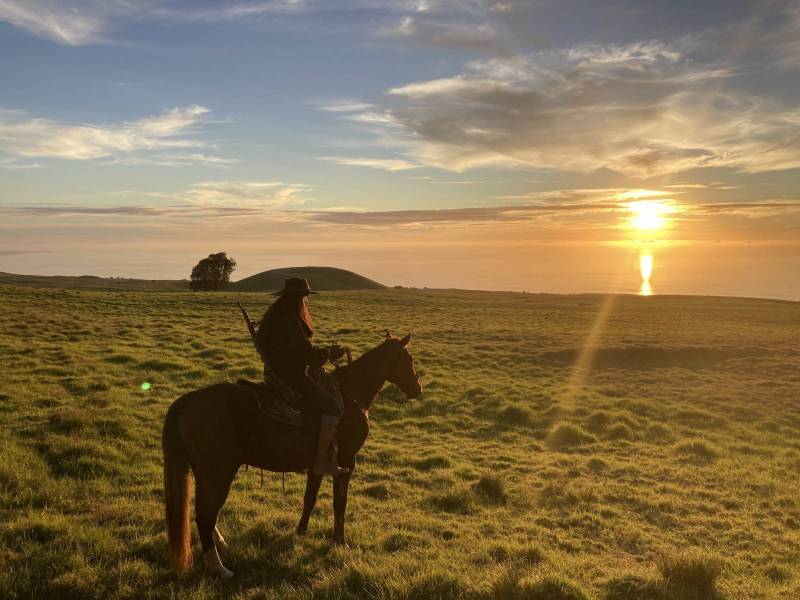
Jason Scott Lee as Kaluaikoolau, a paniolo from Kauai who became a symbol of resistance to the round up and forced relocation to Molokaʻi of individuals who contracted leprosy. Photo credit: Fern White
How North Kohala Became Kalalau Valley
OK, now for the fun part. I have seen the film twice so far, with friends from North Kohala who were proud and amused in equal measure to see our places transformed into Kauaiʻs Kalalau mountains.
The cast and crew were in residence, and most of the film was shot, at Hawaii Island Retreat.
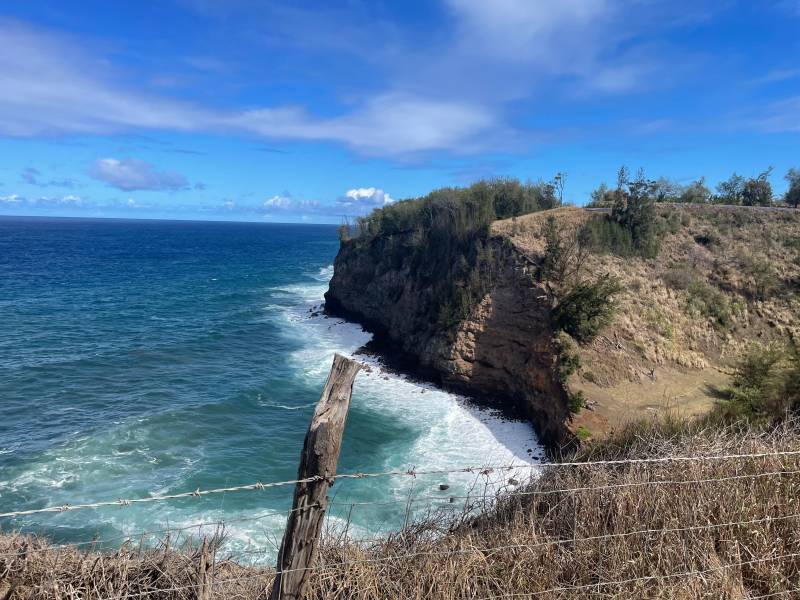
You will recognize this remote North Kohala oceanfront location from the film. It gets transformed into the Kalalau Valley on the northwest shore of Kauai.
Kohalaʻs esteemed educators and ranchers Fern White and Alvin Kawamoto provided horses for the filming of the early movie scenes on the ranch where Koolau works.
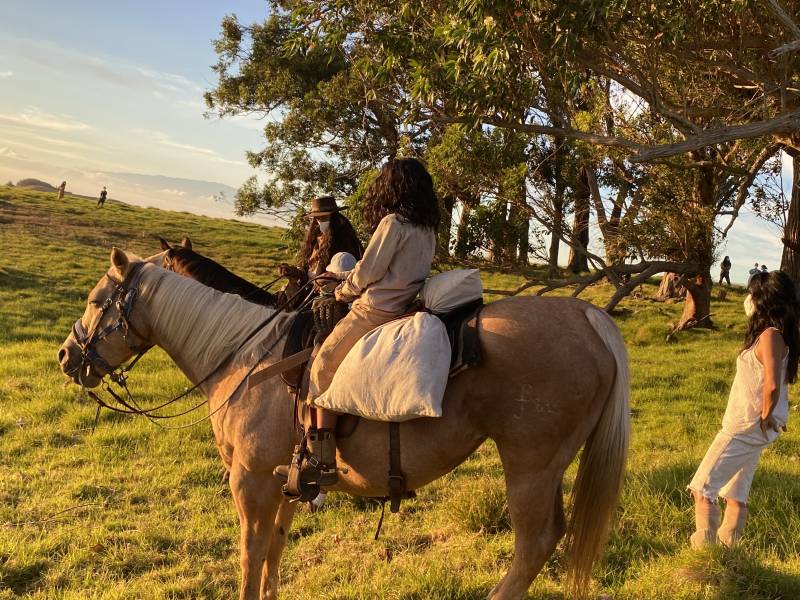
Note the authentic Hawaiian tree saddles…and the masks worn by cast and crew during the pandemic when not actually shooting a scene. Photo credit: Fern White
Remember this waterfall property I sold a few years back? Even before I saw the credits, I recognized the location.
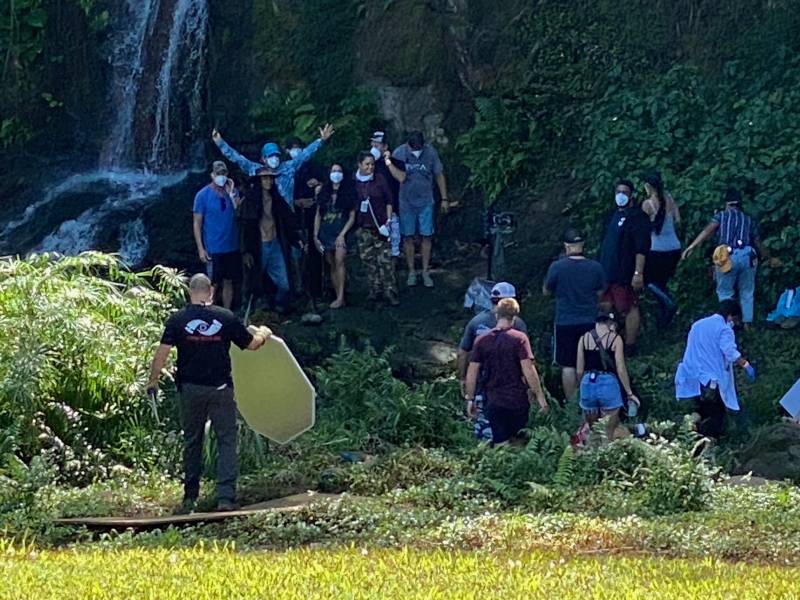
Cast and crew assemble to film one of the waterfall scenes from The Wind and the Reckoning. Photo credit: Marc Hutchinson
And a final shout out to Hawaii Lifeʻs own Carrie Nicholson whose husband acted in the film and whose construction company created sets!
Understanding History and Culture
Now for my lecture.
I have written other blogs posts about how important it is for anyone making Hawaiʻi their home or second home to understand the place, people and culture at more than just a superficial level. The Wind and the Reckoning explains not only the specific circumstances of how families were brutally ripped apart; it also gives an accurate picture of the historical context (e.g. the overthrow of the Hawaiian Kingdom in 1893, and the decimation of the Hawaiian population as Europeans brought diseases to which they had no immunological resistance) and the cultural values of ʻohana and relationship to place that are important in current as well as historic times.
Nothing in the movie is oversimplified. There is a sensitive treatment of the term haole — and Europeans are portrayed in the film as both allies and villains.
For me one of the aspects of the movie that helped transport me was the dialogue. Throughout the film, when Hawaiian characters are speaking with one another, they speak in ʻolelo Hawaii, with subtitles. They switch fluidly to English when communicating with speakers of ʻolelo haole, just as you will find multilingual speakers doing in business, academic and everyday settings in Hawaiʻi today. Learning the basics of pronunciation and using correct names goes a long way towards building relationships in your new home.
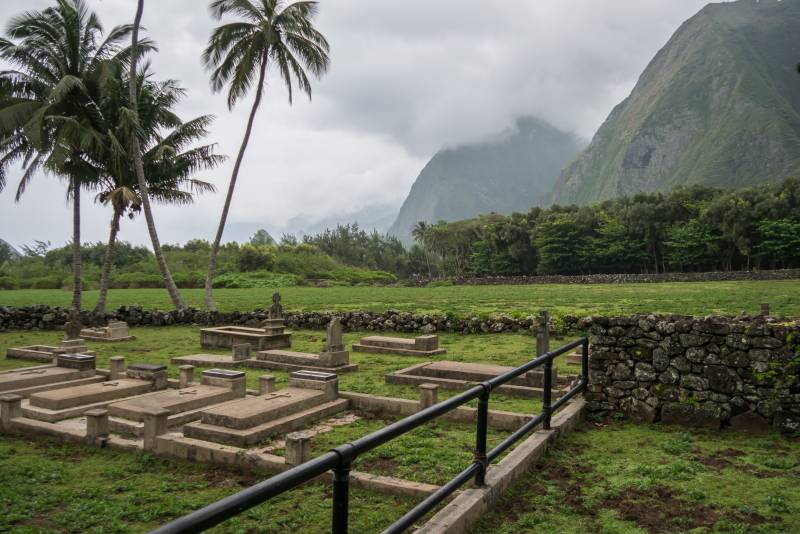
A cemetery at Kalaupapa, Molokaiʻi. Now a National Historical Park.
Go see the movie when it comes to a theater near you! It is pure enjoyable entertainment, with a side of serious education. And if you are moved, please consider a donation to the Kalaupapa Memorial.

Crystal Westergard
December 15, 2022
Great review, will the movie be on a streaming service?
Sandi Morey
March 30, 2024
I can’t wait to see this movie. In 1994 we hiked down to Kalaupapa, took the tour & with a half hour head start I beat the mules by 15 minutes hiking up the Pali. We loved the experience of the historical tour and I had already read several fiction books about the time period and what awaited those with ashy skin, confined for life at Kalaupapa. This film is a
real treat for anyone who loves history and the Hawaiian language. So far the film is only available to stream on Amazon. I hope it will be more widely available soon. Hawaiian history is very important as Hawaii was the first offshore place overthrown and taken over in occupation after the Indians were devastated in the 19thcentury. Great significance especially with Gaza being genecided at present.
Beth Robinson
March 30, 2024
> Mahalo for your comment and endorsement of the film.